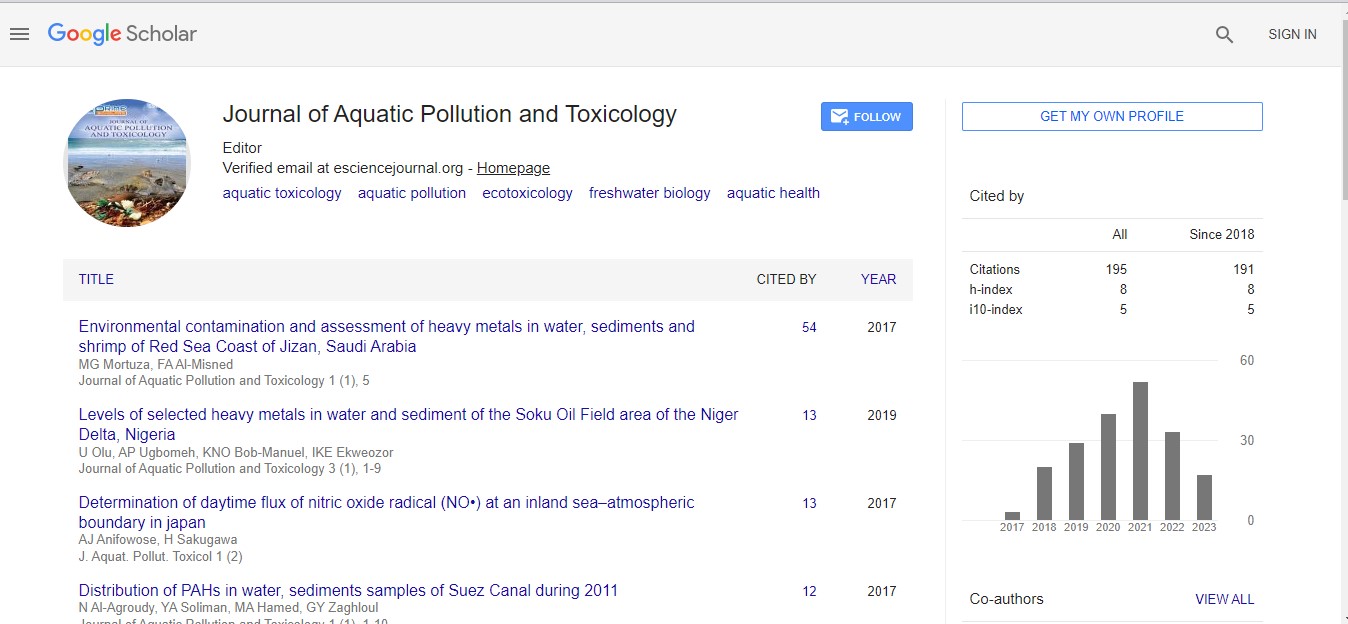Rachel Bezbaruah*
Department of Environmental Studies, Barkatullah University, Bhopal, India
- *Corresponding Author:
- Rachel Bezbaruah
Department of Environmental Studies
Barkatullah University, Bhopal, India
E-mail: Rachel_bezbaruah @gmail.com
Received: January 02, 2021; Accepted: January 15, 2021; Published: January 22, 2021
Citation: Bezbaruah R (2021) Successful Journey of Journal of Aquatic Pollution and Toxicology. J Aquat Pollut Toxicol. Vol. 5 No. 5: 1.
Journal of Aquatic Pollution and Toxicology expresses gratitude to all its elite panel of editorial board members for their continuous efforts, support and encouragement throughout the publication journey of the journal, right from its inception in the year 2017, and congratulates them for making this journal to achieve its goals and becoming successful as one of the leading and well- recognized presenter of scientific outcomes in the field of toxicity and pollution Research.
Every year we published with different volumes and different issues. All published articles subjected to the journal’s double-blind review process. The topics for the 2020 year were varied and exciting. The biggest category was probably Aquatic Toxicology, Pollution and Toxicology, Freshwater Biology but there is so much more involving scientists as academicians and young researchers. The current volume of the journal is 5 with issue 2.
We believe your contribution will enhance the worth of the issue in 2021 in the field of toxicity and pollution Research include Aquatic Organic Pollutants, toxic chemicals that adversely affect human health, Aquatic Health Management, Adoption and promotion of ecosystem health concept and Enhancing the understanding of marine and freshwater, structure, function, ecology and food web dynamics.
The journal’s classifications are Ecotoxicology, Aquatic Contamination and Toxicology, Freshwater Biology, Toxic agents, Aquatic environments, Water protection policy, Soil and water pollution, Ecosystem research, Flooding and pollution, Extreme weather events and pollution, Pollution and climate.
The social media can play a key role in the spreading of research works with increased visibility, citation and ultimately the impact of published works. We promote published articles to the social media. This will benefit the researcher to increase reputation and attendant career progression. For example, the Facebook account, Twitter, LinkedIn and Instagram.
According to the Google Analytics, more than 20,330 readers are visiting to our journal websites for submitting manuscripts, to browse the latest research published on toxicity and pollution Research and to refer the published content for conceptualizing their research study, deriving research hypotheses, case reports and validating their contributions. Readers from the major countries including United States, Japan, United Kingdom, India, Egypt and Nigeria visit our journal domain to learn about the ongoing research activities in this field.
On behalf of the IPJAPT Editorial Board and the whole Editorial Office, I would like to express our gratefulness to the authors of articles published during the past years, and to acknowledge generous help which both the authors and editors obtained from the peer-reviewers.
Our aspiration is to facilitate scientific discovery in the new ways by exploring new technologies in the field of toxicity and pollution Research.

